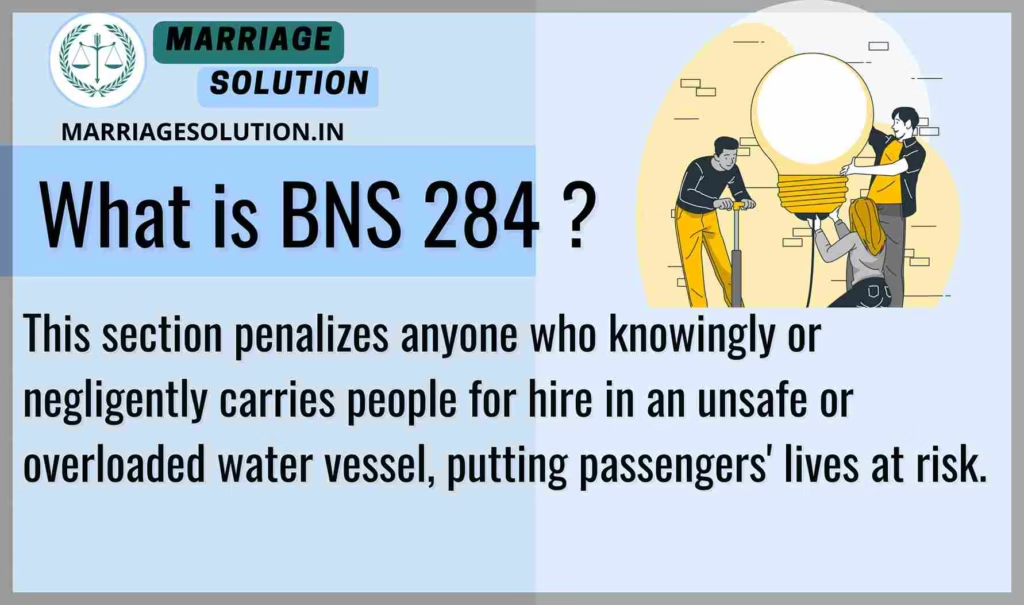Introduction of 284 BNS
BNS Section 284 is a law created to protect passengers who travel by boats, ferries, or ships for hire. It punishes anyone who knowingly or carelessly carries people in an unsafe or overloaded vessel, because such acts put human life at serious risk. This section ensures that transport operators are legally responsible for passenger safety on waterways.
The Bharatiya Nyaya Sanhita (BNS) Section 284 replaces the old Indian Penal Code (IPC) Section 269.
What is BNS Section 284 ?
This section penalizes anyone who knowingly or negligently carries people for hire in an unsafe or overloaded water vessel, putting passengers’ lives at risk.

Under Section 284 of the bns act 2023
Whoever knowingly or negligently conveys, or causes to be conveyed for hire, any person by water in a vessel that is unsafe or overloaded, endangering human life, shall be punished with imprisonment of up to six months, or a fine of up to ₹5,000, or both.
1. Meaning of the Provision
- The section applies to all who run boats, ferries, or ships for payment.
- It punishes both knowingly unsafe acts and negligent behavior.
- “Unsafe vessel” means not fit for safe travel (damaged, weak structure, no safety gear).
- “Overloaded vessel” means carrying more passengers or cargo than the safe limit.
2. Scope of the Law
- Applies to ferries, boats, ships, and all water transport for hire.
- Both individuals and companies operating water transport can be held liable.
- Covers situations where danger exists, even if no accident happens.
3. Essential Ingredients
To prove guilt, it must be shown that:
- A person was conveyed by water for hire.
- The vessel was unsafe or overloaded.
- The accused either knew it was unsafe/overloaded or was negligent.
- The situation created danger to human life.
4. Examples of BNS 284
- Example 1: A ferry owner knowingly loads 60 passengers in a boat designed for 30. This act endangers everyone and is punishable.
- Example 2: A tourist boat operator fails to provide life jackets and carries passengers despite visible cracks in the hull. This is negligence under BNS 284.
5. Punishment under BNS 284
- Imprisonment: Up to 6 months.
- Fine: Up to ₹5,000.
- Both: The court may impose both in serious cases.
6. Legal Classification
- Bailable: The accused has the right to get bail.
- Cognizable: Police can take action without prior approval of a Magistrate.
- Non-compoundable: Cannot be settled privately.
- Triable by: Any Magistrate.
7. Importance of BNS Section 284
- Protects passengers from accidents caused by unsafe water transport.
- Holds operators accountable for carelessness and profit-driven risks.
- Promotes public trust in waterway travel.
- Encourages compliance with safety standards in boats and ferries.
Section 284 BNS Overview
This section penalizes anyone who knowingly or negligently conveys a person for hire in a water vessel that is unsafe or overloaded, thereby endangering the passenger’s life. The punishment includes imprisonment of up to six months, a fine up to ₹5,000, or both. The offense is classified as cognizable, bailable, non-compoundable, and is triable by any Magistrate.
10 Key Points of BNS Section 284
- Purpose of the Section
BNS Section 284 is designed to protect passengers using water transport services. It ensures that vessels carrying people for hire are safe and not overloaded. By penalizing negligence, this provision encourages adherence to safety protocols in water transportation. - Who Can Be Punished
This section applies to individuals or organizations responsible for transporting people by water for hire. Whether the act of overloading or unsafe conditions is deliberate or negligent, the person or entity in charge is liable under this section. - Acts Covered Under the Section
The section penalizes two main acts: (a) knowingly conveying passengers in unsafe conditions and (b) negligently allowing unsafe or overloaded vessels to operate. Both intentional and careless behavior are covered to ensure accountability. - Punishment Details
The punishment for violating this section is imprisonment of up to six months, a fine up to ₹5,000, or both. This dual penalty system ensures that the seriousness of the offense is adequately addressed while offering flexibility in sentencing based on the case’s specifics. - Classification of the Offense
The offense is classified as cognizable, meaning police can register a case and investigate without prior approval from a Magistrate. It is also bailable, allowing the accused to secure bail easily, and non-compoundable, meaning it cannot be settled between parties out of court. - Role of Negligence and Intent
Whether the act was done knowingly or negligently, both are punishable under this section. This ensures that transport operators cannot escape liability by claiming ignorance of the unsafe conditions. - Impact on Public Safety
Unsafe or overloaded vessels pose a significant risk of accidents, including capsizing. By penalizing such acts, this section aims to reduce water transport accidents and protect passengers’ lives. - Triable by Any Magistrate
The offense is triable by any Magistrate, ensuring quick and accessible legal proceedings. This setup allows for cases to be handled efficiently, reducing the burden on higher courts. - Scope of Application
This section applies to all forms of water transportation for hire, including boats, ferries, and ships. It holds operators accountable for maintaining safety standards irrespective of the size or type of vessel. - Encouraging Compliance
The provision acts as a deterrent for transport operators, urging them to follow safety regulations. It also promotes public awareness about their right to safe and secure transportation, empowering passengers to report violations.
Example 1:
A local ferry operator in Kerala is carrying passengers across a river. Despite warnings about an upcoming storm and knowing that the boat has cracks in its hull, the operator loads the boat beyond its capacity to earn extra money. Midway, the boat begins to leak and tilt dangerously due to the overloading and poor condition, putting the passengers’ lives at risk.
This is a violation of BNS Section 284 because the operator knowingly used an unsafe and overloaded vessel for hire, endangering passengers.
Example 2:
In Varanasi, a small boat is used to take tourists on the Ganga river for sightseeing. The operator fails to inspect the boat’s life jackets and other safety equipment before the trip. Additionally, the boat is slightly overloaded with tourists. During the ride, the boat begins to sway dangerously when the water becomes turbulent, alarming the passengers.
This situation falls under BNS Section 284 because the operator neglected basic safety checks and allowed overloading, creating a risk for those on board.
BNS 284 Punishment
- Imprisonment: Up to 6 months
- Fine: Up to ₹5,000
- Both: Possible

BNS 284 bailable or not ?
BNS Section 284 is bailable, meaning the accused can obtain bail easily.
Comparison table for BNS Section 284 vs IPC Section 269
| Section | What it Means | Punishment / Consequence | Bailable | Cognizable | Trial By |
|---|---|---|---|---|---|
| BNS Section 284 | Penalizes anyone who knowingly or negligently conveys people by water for hire in an unsafe or overloaded vessel, endangering passengers’ lives. Ensures accountability of boat or ferry operators. | Imprisonment up to 6 months, or fine up to ₹5,000, or both. Applies even if no actual accident occurs but risk is created. | Bailable | Cognizable | Any Magistrate |
| IPC Section 269 (Old) | Punished anyone who negligently did any act likely to spread infection dangerous to life. It was a general provision on negligence, not limited to transport safety. | Imprisonment up to 6 months, or fine, or both. Covered a wider range of public safety acts but lacked specificity for transport cases. | Bailable | Cognizable | Any Magistrate |
| Key Difference: BNS Section 284 specifically targets unsafe or overloaded water transport for hire, protecting passengers’ lives, while IPC Section 269 dealt broadly with negligent acts likely to spread infections. BNS 284 narrows focus to waterway safety and accountability. | |||||
BNS Section 284 FAQs
What is the punishment under Section 284?
The punishment is imprisonment of up to six months, a fine up to ₹5,000, or both.
BNS 284 is the offense bailable?
Yes, the offense under Section 284 is bailable, allowing the accused to secure bail.
What type of offense is it?
It is a cognizable, non-compoundable offense, triable by any Magistrate.
Who can file a complaint under this BNS Section 284?
Any affected person or concerned authority can file a complaint about unsafe or overloaded water transportation.
Conclusion
BNS Section 284 is a safety law for waterways. It ensures that boat and ferry operators act responsibly by not carrying passengers in unsafe or overloaded vessels. With penalties of imprisonment or fine, the law creates accountability and protects lives. In short, it strengthens public safety on rivers, lakes, and other water routes where passenger transport is common.
Need Legal Support?
If you are dealing with court cases, marriage problems, or any other legal issue, our team at Marriage Solution – Lawyer Help is here for you. Simply fill out our quick online enquiry form, and we’ll connect you with the right legal expert to support your needs.
Finished with BNS 284 ? Continue exploring the next provisions of the Bharatiya Nyaya Sanhita (BNS), 2023. Each section includes explanations, examples, and plain-language breakdowns for easy understanding.
- 285 BNS : Danger or obstruction in public way or line of navigation.
- https://marriagesolution.in/bns_section/285-bns/
- 286 BNS : Negligent conduct with respect to poisonous substance.
- https://marriagesolution.in/bns_section/286-bns/
- 287 BNS : Negligent conduct with respect to fire or combustible matter.
- https://marriagesolution.in/bns_section/287-bns/
- 288 BNS : Negligent conduct with respect to explosive substance.
- https://marriagesolution.in/bns_section/288-bns/
- 289 BNS : Negligent conduct with respect to machinery.
- https://marriagesolution.in/bns_section/289-bns/
Full IPC Section List: https://marriagesolution.in/ipc-section-list
All Indian Law & Blogs: https://marriagesolution.in/indian-law/
Full BNSS Section List: https://marriagesolution.in/bnss_section-list
